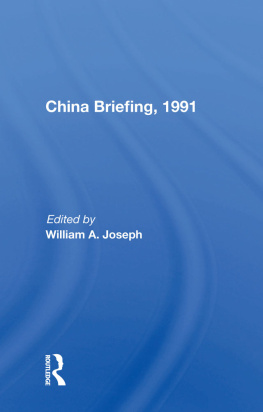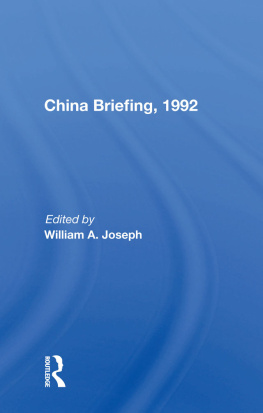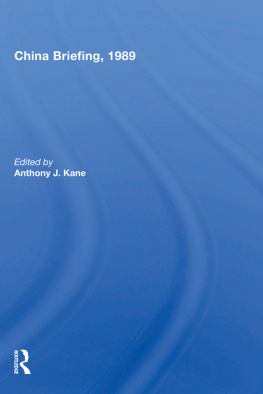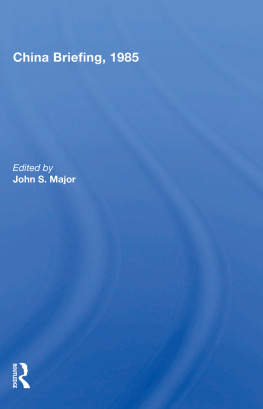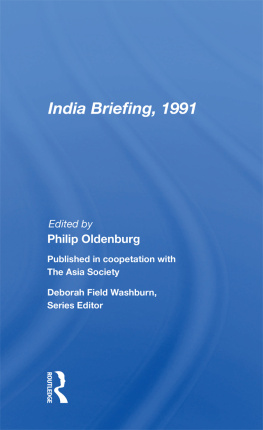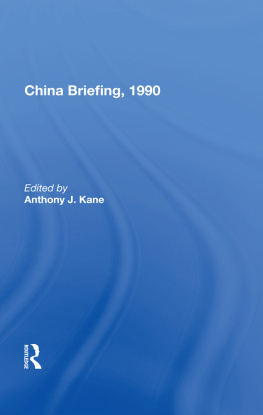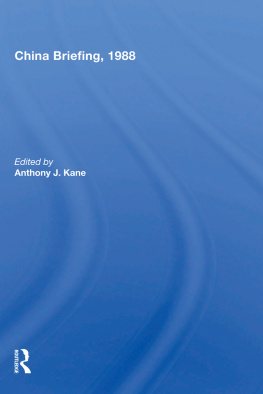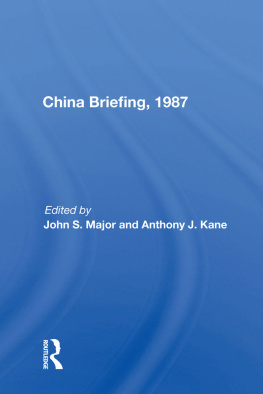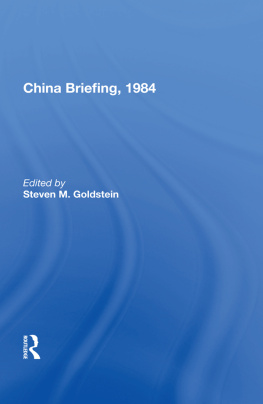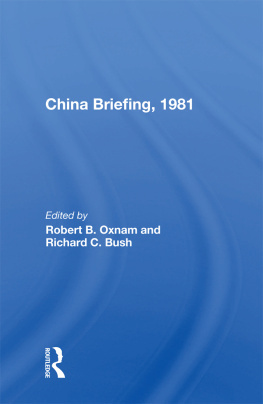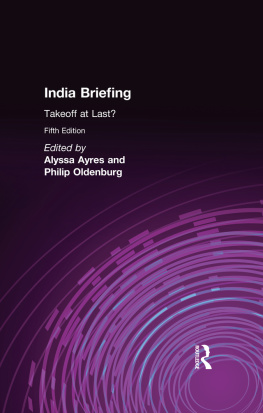China Briefing, 1991
edited by
William A. Joseph
Published in cooperation with The Asia Society
Deborah Field Washburn
Series Editor
Cover characters designed by Willow Chang
First publishing 1992 by Westview Press, Inc.
Published 2018 by Routledge
52 Vanderbilt Avenue, New York, NY 10017
2 Park Square, Milton Park, Abingdon, Oxon OX14 4RN
Routledge is an imprint of the Taylor & Francis Group, an informa business
Copyright 1992 by The Asia Society
All rights reserved. No part of this book may be reprinted or reproduced or utilised in any form or by any electronic, mechanical, or other means, now known or hereafter invented, including photocopying and recording, or in any information storage or retrieval system, without permission in writing from the publishers.
Notice:
Product or corporate names may be trademarks or registered trademarks, and are used only for identification and explanation without intent to infringe.
Library of Congress ISSN: 0740-8005
ISBN 13:978-0-367-00439-2 (hbk)
ISBN 13:978-0-813-31364-1 (pbk)
Contents
WILLIAM A. JOSEPH
RICHARD BAUM
ELLIS JOFFE
JUDY POLUMBAUM
BARRY NAUGHTON
TYRENE WHITE
DAVID ZWEIG
EDWIN A. WINCKLER
NANCY R. HEARST
Guide
China Briefing, 1991 is the tenth in a series of annual assessments co-published by The Asia Society and Westview Press. This year's volume covers all of 1990 and the first half of 1991, focusing on the aftereffects of Tiananmen on China's domestic politics, economics, society, and foreign relations.
This edition of China Briefing offers remarkable insights into the crosscurrents flowing through contemporary China. The chilling impact of 1989 is deeply felt in political life, in military affairs, and in the pressas several authors recount here. The buoyant optimism of the 1980s has turned to somber quietude in the 1990s.
Nevertheless, the big event still lies aheadthe succession process following the deaths of Deng Xiaoping and other aging leaders. Some China specialists foresee the rise of reform-minded municipal and provincial politicians and technocrats over the course of this decade. Others have considerable doubts that the goal of a more plural, politically sensitive China will be reached very soon.
Given this mixed prognosis, the mood underlying China Briefing, 1991 is one of caution tinged with understandable pessimism. That mood also pertains to U.S.-China relations. Twenty years after the famous dtente of 1971-72, the bilateral ties are close to being on the rocks. Clashes have replaced communiqus. The divisive issues of Most Favored Nation, serious trade imbalances, GATT membership, convict labor, and human rights abuses are now central to the U.S.-China agenda. With few exceptions, the highest leaders of both countries no longer meet with each other in public or in private.
At the same time, China Briefing conveys some cautiously optimistic perceptions. Much of China's economic reform policy, as evolved in the decade from 1978-88, remains intact. Both statistical data and personal observations confirm that China's incredible economic takeoff was not totally destroyed by Tiananmen. On the other hand, the passionate momentum that once underlay the reforms has abated somewhat, and major policy decisions, particularly price reform in staple commodities, have been postponed.
A huge question mark hangs over what is now called "Greater China"the linkages between the PRC, Hong Kong, and Taiwan. Much hope has been generated by the web of economic and human ties between Taiwan and mainland China. Mixed signals come from Hong Kong: some business leaders feel confident about their future under Chinese sovereignty after 1997, but the outflow of professionals continues at an alarming rate.
AU of these questions rest on leadership changes in Beijing. We cannot predict China's future with confidence, but we can and will offer our best insights into current developments and outline possible future scenarios.
I wish to thank the authors of this year's China Briefing for being conscientious, thorough, and responsive to our needs. Special credit for the end result goes to William Joseph, who commissioned the chapters and edited them with skill and sensitivity,
As with previous volumes, Susan McEachern, Alison Auch, and their colleagues at Westview Press made available their considerable publishing expertise. At The Asia Society, Andrea Sokerka carefully and efficiently assembled the manuscript, and Courtney Hurley provided excellent editorial and research assistance during her stint as publications intern. Our deepest appreciation goes to Deborah Field Washburn, Senior Editor, who worked with great energy and skill to bring this publication to press.
Robert . Oxnam
President
The Asia Society
October 1, 1991

William . Joseph
A specter is haunting China. Not the specter of communism proclaimed by Karl Marx in his Manifesto to be haunting Europe in the mid-19th century, but the specter of Tiananmen. Marx heralded the communist specter as an omen of a new socialist world; ironically, the specter of the Tiananmen massacre may well be a portent of the final chapter of communist rule in China and another installment in the global demise of communism. The major theme of China Briefing, 1991 is the chilling effect that the tragic events of June 1989 continue to have on nearly every aspect of life in the People's Republic of China.
This volume focuses mainly on developments in China from the beginning of 1990 through mid-1991. As many of the contributors observe, the political situation in the PRC in this period was characterized by "paralysis," "immobility," and "uncertainty," while the public mood was one of "quiescence," "timidity," and "alienation." Nevertheless, this has been an eventful time in the PRC, and much has happened that can provide important clues to the nature of the post-Tiananmen order and to the underlying tensions that are likely to be decisive as China moves toward the 21st century.
The brutal suppression of the democracy movements in Beijing and other Chinese cities in June 1989 has left the legitimacy of the Chinese Communist Party (CCP) in a shambles. Deng Xiaoping's program of economic reform, political change, and cultural liberalization had begun to repair some of the damage done to the party's image by the follies of the Maoist era. By presiding over a period of unprecedentedthough still limitedprosperity and freedom through most of the 1980s, the CCP staked its claim to lead China into the future. But the fateful decision of Deng and other party elders to crush the democracy demonstrations may have dealt a fatal blow to that claim.
As Richard Baum points out in the opening chapter, there are numerous ways in which the party's "dramatic loss of prestige and popularity" in the wake of Tiananmen is apparent even while outright opposition is impossible in the prevailing climate of repression. Small acts of symbolic defiance are a fairly common occurrence; but more telling of the fragile state of communist authority in China is the tenuous control that the party now exercises over vital bulwarks of its rule. Several authors examine the erosion of central authority and the acceleration of the trend toward provincial and local assertiveness since Tiananmen. Baum notes the "conspiracy of silence" that met demands by CCP hard-liners for the punishment of party and state officials who supported the democracy movement; this resistance by inaction reflects "the regime's apparent loss of political support within China's vast state bureaucracy," and is, according to Baum, just one aspect of a pervasive legitimacy crisis that now engulfs the Chinese communist state. Two other mainstays of communist power in Chinathe military and the mediamay also no longer be able to be counted on to act as compliant tools of the top party leadership in any and all circumstances. Although the People's Liberation Army (PLA) lived up to its professional ethic and followed the orders of the civil authorities in quelling the Tiananmen demonstrations, the damage to military morale and prestige caused by that action has had a marked impact on the outlook of many PLA leaders. Ellis Joffe documents the brooding mood of PLA commanderswhich he characterizes as "silent, sullen, and waiting"as they endure for the time being the party's campaign to ensure the army's political loyalty at the expense of military professionalism.





